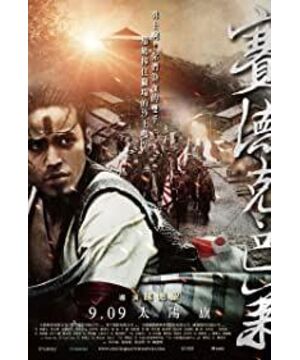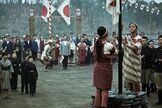"Seediq Bale" is the second film directed by Wei Desheng that I have seen. The previous one was "Cape No. 7". Like this "Seediq Bale", it shows Taiwanese culture and reviews. The theme of the War of Resistance Against Japanese Aggression, if the former is a gentle memory, then the latter is a positive revelation and accusation of that war. In fact, I am not very keen on watching war movies, but I also refuse to be moved by the brilliance of humanity bursting out of that extreme living environment. I think this is the most watchable part of war movies. And in the movie Seediq Bale, the keyword that I feel most humane is undoubtedly resistance. This kind of resistance is a bit peculiar. It does not come from the head-on collision of civilized society or the struggle for power and profit between political groups, but from the desire for freedom of Taiwanese aborigines out of human nature. Because I think this kind of resistance to pursue freedom is the most authentic manifestation of human nature, and it can better reflect the most fundamental conscience in people's hearts.
Because of the Shimonoseki Treaty signed by the Qing government, Taiwan has experienced a dark history of being colonized by Japan for nearly a century and a half. In the dense jungle of Taiwan, the original ecological law of natural selection of the aborigines was completely trampled and destroyed by foreign invaders. It is fair to say that the arrival of the Japanese did bring modern civilization to this unexplored and ignorant island, which has also become a high-sounding benefit that the colonists have trumpeted, but history has witnessed even more Looting in an unsustainable manner, the colony's population was mostly looted or enslaved and deprived of basic freedom of existence. This situation is especially cruel to the Taiwanese aborigines who were colonized by Japan in the film. Although I still saw the fusion of folk culture during this period, such as an aboriginal young man marrying a Japanese woman, for example, he could buy fashionable goods imported from Japan, but the ruling power was firmly in the hands of the military. It means that enslavement and repression have become the main tone of the aboriginal existence.
In such a state of existence, many young and strong aboriginals can't bear it anymore, and personal revolts occur from time to time, but the tribal leader Mona Ludao, who has experienced the failure of the previous generation's revolt, has been in a cruel and strife environment. He maintains an attitude of silence and forbearance. The comparison of the strength of the enemy and the enemy is not without measure in his heart. If he is reckless with the consequences, the price he has to pay will make the lives of his clansmen pay a huge sacrifice, so if there is no conflict, there will be no conflict. , If you can't see the blood, you can't see the blood, and saving the lives of the tribe is the top priority. However, forbearance does not mean that the defense is removed. In fact, Mona Ludao has been accumulating people and weapons in secret. After all, fighting against any enemy relies not only on justice and courage, but also reserves and strength. In fact, I personally agree with the attitude of this seemingly rough and brave tribal patriarch towards national hatred and foreign aggression. I think that no matter how many generations are separated, the painful memories of the war of aggression against China left by our nation are nothing but erasing, but this cannot be a reason for impetuous noise. A few years ago, I saw an online anti-Japanese war on a certain forum, but it was a They are eloquent and full of righteous indignation, but between the lines is nothing more than using violence to control violence. In their consciousness, they equate morale with dignity, but a nation that advocates violence will never win respect and will never be written down in history. on the storybook. I think that what can really overwhelm violence is dignity. This kind of dignity comes from diligently cultivating internal strength and from the atmosphere of turning battles into jade and silk. The image of a dignified big country is the most solid shield against foreign aggression.
But the tree wants to be quiet and the wind is not enough. A nation enslaved by foreign forces can never predict when the other party will gain an inch. Finally, one day, a young man and a woman from the Mahpo Society got married. Painful banquet, the newly appointed Japanese police came to inspect. Mona Ludo's eldest son, Dadomona, warmly greeted the Japanese police for drinking, but was beaten inexplicably because of his dirty hands; the resentful Dadomona, together with his brother Basomona, beat the newly appointed policeman. Got bloody. Due to a misunderstanding, the tension between the Japanese police and the Seediq people was planted. Since then, the Mahpo Society has lived in the shadow of repeated alarms. A few days later, the Japanese really threatened to punish the tribe. Therefore, the Gaoshan people decided to do it first. Because the Japanese will gather at the upcoming sports meeting, which is a good opportunity to rebel. Mona Ludao contacted and assembled 300 men in hardcover from the same tribe and collateral tribes to participate in the counterattack. The old and weak women and children were not allowed to participate. He wanted to make the strongest counterattack at the least cost.
However, once the war starts, the situation cannot be controlled by both sides. Although the resistance action, which is called the "Wushe Incident" in history, went well at the beginning, the Seediq people took advantage of their geographical advantage and speed to put several Japanese policemen nearby. The strongholds were annihilated one by one. However, when the Japanese generals began to pay enough attention to the riots of the aborigines, they began to mobilize the main force of the Japanese army to carry out clearing and suppression. In the case of the disparity in the number and strength of the two sides, Mona Ludao decided to retreat to the deep mountains and jungles to prepare for In a roundabout and protracted war with the Japanese army, the personnel involved in the war were not only the 300 strong men at the beginning, but even the teenage boys took up the responsibility of sending letters and liaisons between the various tribes. The entire Seediq people can be described as The scene of the women in the tribe committing suicide in order to save the few remaining grains of food for the anti-Japanese warriors was shocking to me when I watched it. The cruelty of war is nothing like this!
In fact, after that, the film entered the climax of one after another of war scenes. Some people said that the war scenes in this film were too real, too tragic and bloody, but I feel that the film is actually showing war scenes. At that time, no matter which side the situation on the screen fell to, it did not use a passionate and high-profile march style, but a sympathetic adagio, almost like a requiem. I think this is actually the attitude towards war that the main creator of the film wants to convey to the audience. In war, no matter whether it is in the name of justice or who wins or loses, God will have the virtue of good life. The reasons for launching the killing are all contrary to the most fundamental human nature. From a person, a nation, or even a country, to hatred and foreign criminals, only by maintaining dignity and not being arrogant can they be inviolable in spirit and strength, and I think that being arrogant and not angry is always the best expression of dignity.
View more about Sai de ke · ba lai: Tai yang qi reviews











